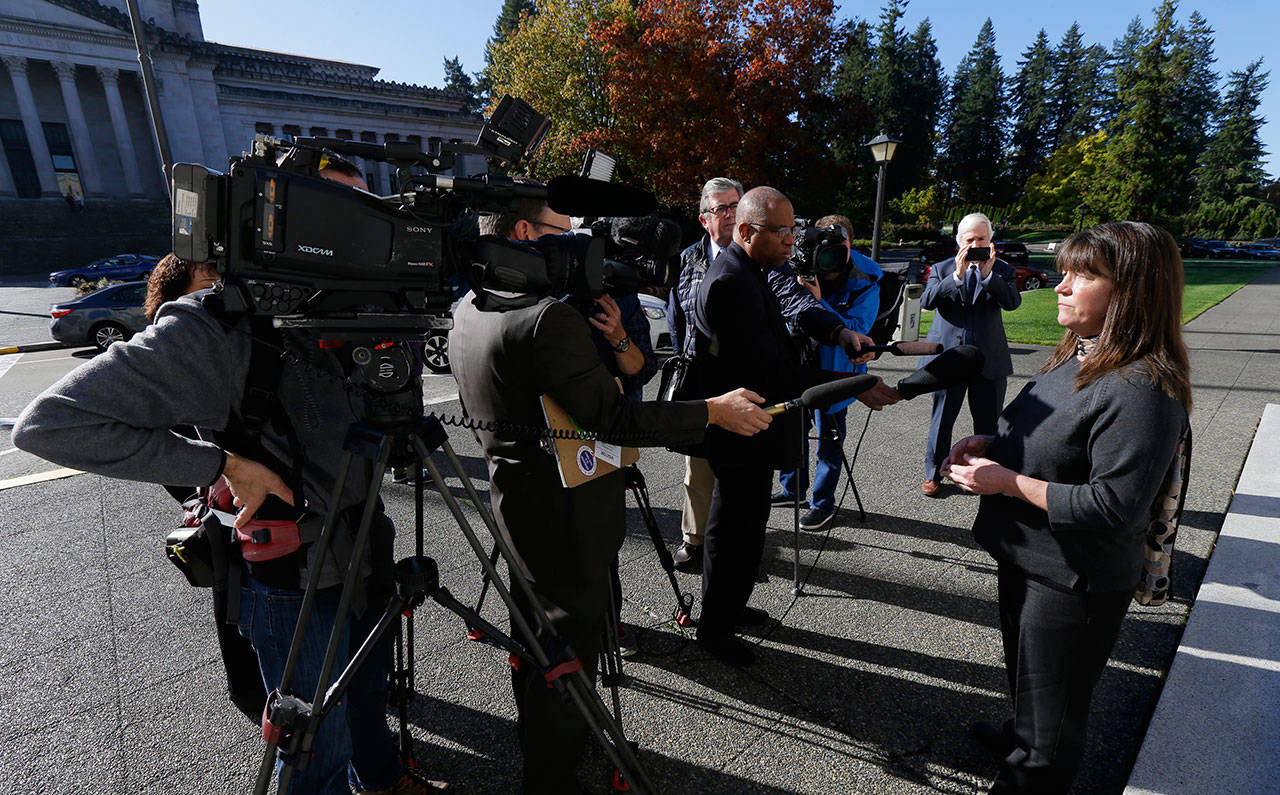By Rachel La Corte
The Associated Press
OLYMPIA — Attorneys for the state of Washington told the state Supreme Court on Tuesday they have complied with a court mandate to fully fund the state’s basic education system, calling recent legislation a “sea change,” but an attorney for the coalition behind the long-running lawsuit disagreed and asked the court to force the Legislature to amend their most recent efforts.
The state has been in contempt of court since 2014 for lack of progress on satisfying a 2012 ruling that found that K-12 school funding was not adequate. Washington’s Constitution says that it’s the Legislature’s “paramount duty” to fully fund the education system.
Lawmakers needed a funded plan in place this year ahead of a Sept. 1, 2018, deadline.
Lawmakers went into overtime sessions this year far beyond their regularly scheduled 105-day session to approve a plan to increase spending on K-12 public schools that allocates billions in new spending over the next four years.
The biggest piece of the court order that the Legislature had to wrestle with was figuring out how much the state must provide for teacher salaries. School districts currently pay a big chunk of those salaries with local property-tax levies.
The plan that was ultimately signed into law relies largely on an increase to the statewide property tax that starts next year. The tax increases from $1.89 to $2.70 per $1,000 of assessed value, with the increase earmarked for education.
The plan — which keeps in place local property tax levies but caps them beginning in 2019 at a lower level — will ultimately raise property taxes for some districts and lower them in others. Under the plan, the minimum starting salary for teachers will increase, with adjustment for inflation and regional differences.
One of the questions raised by the court was the fact that the plan isn’t fully phased in by the September 2018 date.
“How is that compliance?” asked Justice Steven Gonzalez.
The case began in 2007 when two families joined school districts, teacher unions and community groups to sue the state, saying it was derelict in its duty to adequately pay for K-12 schools education.
The 2012 ruling became known as the McCleary decision, named for the lead plaintiff, Stephanie McCleary, who is the human resources director for Chimacum School District.
Deputy Solicitor General Alan Copsey said the Legislature “has done everything it can do” for the current two-year budget cycle but said everything is in place for full funding of the teacher salary component by the 2019 school year.
“This is a sea change in funding for state education,” he said. “There are lots of moving parts that have to occur in a choreographed sequence.”
But Tom Ahearne, an attorney for the coalition of school districts, parents, teachers and education groups that sued the state, argued that lessening the money from the local levy system and handing it back through the statewide property tax is not the way to amply fund the schools.
“Changing the name of the dollar doesn’t change the underfunding,” he said.
Several justices asked Ahearne in various ways what exactly he wanted the court to do. He ultimately said he wanted an order that the state has not complied and requiring the Legislature during next year’s session “to enact a budget that actually complies with the ruling in this case.”
Justice Sheryl Gordon McCloud asked Copsey whether the Legislature could do more during next year’s 60-day session.
“If the short session has the capacity to do something more, then wouldn’t that weigh in favor of us doing something to compel further compliance?” she asked.
Copsey responded that “predicting what the Legislature will be capable of doing in a short session is a dangerous game.”
Chief Justice Mary Fairhurst jumped in at the point to note that the Legislature has had years to come up with a plan, and yet “what has been brought is something that says ‘well we’re not going to do it all, we’ll do some, and we’ll do more later,’ after the timeframe.”
Copsey said while he agreed that full funding is not in place before the 2018 deadline, “I do assert that everything is in place that needs to be in place in order for it to be enacted in the 2019 budget.”
Copsey told the court that while he is asking for the state to be found in compliance for the case to end, he said if the court was uncomfortable with the implementation structure of the funding, that a fallback plan the court could consider is maintaining jurisdiction long enough to ensure the 2019 Legislature follows through.
There is no set timeframe on when the court may rule. The next legislative session begins in January.

